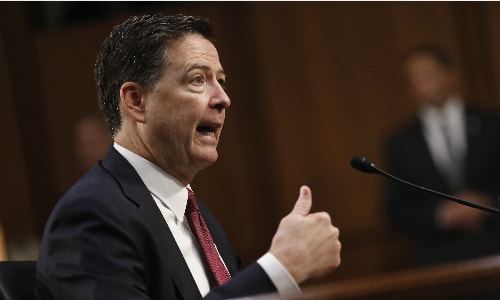Why didn't Comey break the law when he leaked his conversation with Trump?
The former FBI director did not break the law because he did not share classified information, however, he also faced criticism for this action.
 |
Former FBI Director James Comey. Photo: Reuters |
US President Trump on June 8 criticized former FBI director James Comey as a "leaker" for publishing the content of their conversation with a reporter.
Comey admitted to Congress that he asked a friend to give reporters information he had taken about Trump asking him to drop an investigation into former national security adviser Michael Flynn.
However, legal analysts said that does not make Comey a criminal, according to the Washington Post.
“He could be criticized that it wasn’t the best way to express his discomfort. But his relationship with the president is not a legal issue,” said Barry J. Pollack, a defense attorney who has worked on many leak cases.
Prosecutors can only charge people who share classified or national security information with the public. Documents cannot be labeled “secret” to conceal violations of the law or to avoid embarrassment, according to an executive order signed under Obama. It is legal to disclose non-secret information to reporters to satisfy public interest.
Comey told the Senate Intelligence Committee that he did not share classified material. According to Comey's account, Mr. Trump, after a meeting in the Oval Office, met privately with Comey and said of Flynn: "He's a good guy. I hope you can let this go."
Portrait of Michael Flynn
At the time, the FBI was investigating Flynn for his contacts with Russia and whether he lied to government investigators about them. Comey said he meticulously recorded his interactions with the US president and asked a friend to share the contents with a reporter.
He did so “because I thought it might prompt the appointment of a special prosecutor” in the investigation into alleged Russian interference in the 2016 US election. He said he did not reveal the information himself because “the media were always waiting on my street. I was worried that if I went public with it, it would be like feeding seagulls on the beach.”
"Mr. Comey has always presented himself as a man of integrity. But leaking information to the New York Times through an intermediary is hardly considered ethical," Pollack said.
But that helped Comey achieve his goal. A day after the New York Times published its article, Deputy Attorney General Rod J. Rosenstein appointed former FBI director Robert S. Mueller III as special counsel to oversee the Russia investigation.
Trump's lawyers, his supporters, and even the US President himself have criticized Comey. Attorney Marc E. Kasowitz said that Comey's conversations with Trump were "privileged communications with the President" and referred to their release as "unauthorized disclosure."
A person close to the president’s legal team said they are preparing to file a complaint as early as next week with the Senate Judiciary Committee and the Office of the Inspector General, which can investigate criminal matters and prepare public reports on current or former officials suspected of wrongdoing. A spokesman for the office declined to comment.
“I don’t think leaking is a good thing. I think it’s hateful,” said Shannen W. Coffin, a former Justice Department general counsel. “But I don’t think it’s a crime.”
While Comey says he did not share any classified information, legal analysts point out that leakers often claim to have innocent motives, and prosecutors often deny that.
“The man who oversaw the investigation into the largest leak in American history decided to become a leaker when it served his interests,” said attorney Edward B. MacMahon Jr. “It’s ironic.”
According to VNE

